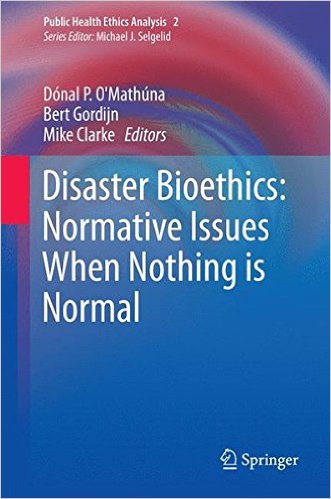 Disaster Bioethics: Normative Issues when Nothing is Normal
Disaster Bioethics: Normative Issues when Nothing is Normal
O’Mathúna, Dónal P.; Bert Gordijn, Mike Clarke, (Eds.), 2014,
ISBN 978-94-007-3864-5,
219 pages, $129.00,
Springer Netherlands
This edited volume brings together an interdisciplinary array of scholars from around the world to discuss disaster bioethics. The 13-chapter volume is divided into two sections. The first one covers questions of health care ethics in disasters and the second focuses on disaster research ethics. The book’s main goal is to foster discussion on ethics in those two spheres, rather than to provide a comprehensive overview or a greater theoretical contribution.
The book offers an insightful examination of some neglected topics within the larger study of disasters that warrant inquiry. For example, one chapter suggests that a macro-ethical approach to disaster bioethics is required to determine what is best for the victim. Another argues that “ethical entry” into disaster-affected communities should be considered mandatory by those who work in these settings in order to avoid further negative impacts on disaster survivors.
Particularly interesting are both the direct and indirect discussion of morality throughout much of the book, which is a fundamental consideration within the context of ethics, but little studied within the context of disaster research. Such discussions can provide needed insight into how fieldwork can be approached in ways that are more culturally competent. For instance, the book criticizes how researchers and aid workers study and treat disaster ‘victims.’ One of its main arguments is that people affected by disasters should not be deemed passive ‘subjects’ of study, but rather as active participants. The ability to carry out work in the aftermath of a disaster is a luxury for the researcher, but traumatic for the victim. This volume argues that scholars and practitioners must place primacy on respect for participants, rather than on more self-serving motivations, such as the idea that practitioners are saving lives.
Disaster Bioethics is a much needed contribution to a field that struggles with how to carry out research in extreme situations. It should be read, at the very least, by any scholar or practitioner who wishes to conduct fieldwork in disaster research.
Natalie Baker is an associate professor of strategy at the National War College. Her research focuses on the importance of social order in instances of disruption. Examples include large-scale crises like disasters, war, or interpersonal trauma. She studies alternative forms of social order, such as criminal governance and spontaneous collective altruism after disasters. In addition, Baker works in collaboration with the Medical College of Wisconsin and Marquette University to study posttraumatic stress in veterans.